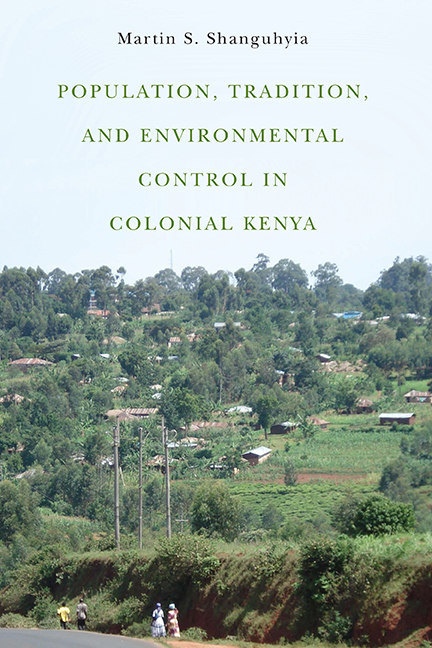Book contents
- Frontmatter
- Contents
- List of Illustrations
- Preface
- Abbreviations
- Introduction
- 1 Administrative and Demographic Changes: Implications on Land Relations, 1900–1930
- 2 Maize and Economic Prosperity, 1920–38
- 3 Internationalizing Degradation Narratives in Kenya, 1930–38
- 4 Prewar Soil Conservation Initiatives and Local Responses, 1934–38
- 5 Wartime Production in a Besieged Environment, 1939–45
- 6 Postwar Development and the Dilemma of “Reviving” African Traditions, 1945–63
- 7 Regional Migration and Failed Agricultural Intensification, 1940–66
- Conclusion
- Notes
- Bibliography
- Index
- Frontmatter
- Contents
- List of Illustrations
- Preface
- Abbreviations
- Introduction
- 1 Administrative and Demographic Changes: Implications on Land Relations, 1900–1930
- 2 Maize and Economic Prosperity, 1920–38
- 3 Internationalizing Degradation Narratives in Kenya, 1930–38
- 4 Prewar Soil Conservation Initiatives and Local Responses, 1934–38
- 5 Wartime Production in a Besieged Environment, 1939–45
- 6 Postwar Development and the Dilemma of “Reviving” African Traditions, 1945–63
- 7 Regional Migration and Failed Agricultural Intensification, 1940–66
- Conclusion
- Notes
- Bibliography
- Index
Summary
An Elusive Colonial Pursuit
A critique leveled against most historical analyses focusing on environmental programs in colonial Africa is their heavy emphasis on the failures or shortcomings of those programs. Analysis of the role of the colonial state in this failure has received the greatest attention. While they may remain critical of that era of colonial development, historians of Africa have also been advised to acknowledge “alternative visions” of the environmental and scientific bases of development programs in that period. However, Vihiga's experience with colonial environmental regulation reveals a compelling and dismal trajectory regarding the state's environmental intervention. Its lasting legacy on this part of Kenya is difficult to ignore. History must record the true nature and outcome of that intervention.
It is clear that Vihiga experienced environmental challenges as a result of several interacting factors, some which were facilitated by the colonial state. These factors ranged from political, social, cultural, economic, and demographic to local geographical conditions. When considered together to explain Vihiga's development dilemmas during the colonial period, they attest to the fact that environmental problems, and their solutions, are invariably complicated. The overarching presence and role of the state in these processes is worth noting. At the foundation of what developed into the Kenya Colony, the authority to make decisions on access to and “proper” use of land always resided with the colonial government. This was so until African communities challenged the government's assumed dominance in matters relating to land. Some, like the Kikuyu, enforced those views through an uprising, while others, such as the Abaluyia, did so through what James Scott has described as a “massive withdrawal of compliance.”
Up until then, government land policies failed to guarantee the security of Africans over their land, and this led to a relationship of mistrust between them, even for the Abaluyia, who never suffered severe land losses except for land that was excised in Kakamega in the early 1930s for gold mining. Fears over land security provided a ready platform for colonial malcontents to rally local opposition to the government in its soil conservation programs. The administration was also insensitive to emerging changes in land tenure patterns.
- Type
- Chapter
- Information
- Publisher: Boydell & BrewerPrint publication year: 2015



